| Srl | Item |
| 1 |
ID:
144022
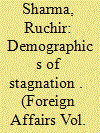

|
|
|
|
|
| Summary/Abstract |
In every single region of the world, economic growth has failed to return to the rate it averaged before the Great Recession [1]. Economists have come up with a variety of theories for why this recovery has been the weakest in postwar history, including high indebtedness, growing income inequality [2], and excess caution induced by the original debt crisis. Although each explanation has some merit, experts have largely overlooked what may be the most important factor: the global slowdown in the growth of the labor force
|
|
|
|
|
|
|
|
|
|
|
|
|
|
|
|
| 2 |
ID:
121069
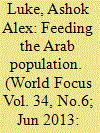

|
|
|
|
|
| Publication |
2013.
|
| Summary/Abstract |
One of the gravest concerns that mankind is facing today is hunger. There are more than 900 million people who go hungry daily around the world and an estimated 25000 people die a day due to hunger and its related causes. Hunger is due to the unavailability of adequate food in sufficient quantities at an affordable price to lead an active and healthy life. Today there is enough food production to feed the global population yet there is a failure in the distribution. Most of the hungry people reside in the developing and the underdeveloped nations.
|
|
|
|
|
|
|
|
|
|
|
|
|
|
|
|
| 3 |
ID:
137809
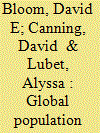

|
|
|
|
|
| Summary/Abstract |
The rapid aging of populations around the world presents an unprecedented set of challenges: shifting disease burden, increased expenditure on health and long-term care, labor-force shortages, dissaving, and potential problems with old-age income security. We view longer life spans, particularly longer healthy life spans, as an enormous gain for human welfare. The challenges come from the fact that our current institutional and social arrangements are unsuited for aging populations and shifting demographics; our proposed solution is therefore to change our institutions and social arrangements. The first section of this essay provides a statistical overview of global population aging and its contributing factors. The second section outlines some of the major challenges associated with widespread population aging. Finally, the third section of the essay describes various responses to these challenges, both current and prospective, facing individuals, businesses, institutions, and governments.
|
|
|
|
|
|
|
|
|
|
|
|
|
|
|
|
| 4 |
ID:
090184
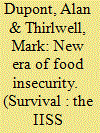

|
|
|
|
|
| Publication |
2009.
|
| Summary/Abstract |
With the world in the midst of the most serious economic downturn since the Great Depression and soft commodity prices depressed, it is easy to forget that barely a year ago sky-rocketing food prices were generating serious political and social strife in more than 30 countries around the world. The price of rice more than tripled in the 12 months to April 2008, while the food price index published by the Food and Agriculture Organisation (FAO) rose by an unprecedented 50%. In 2007, the number of people living in conditions of food insecurity increased by between 50 and 130 million as the global food import bill rose to its highest level on record. Pessimists predicted the end of cheap food presaging a new era of resource insecurity. The spectre of Malthus seemed once again to haunt the Earth. Were these dramatic increases in price merely a cyclical aberration or do they foreshadow a structural shift in supply and demand that will prove the pessimists right? These are not inconsequential questions. The price of food is a matter of profound importance for the economic well-being of billions of people and the political stability of the most affected states. This analysis explores the reasons for the 2008 food crisis by placing it in historical context and drawing out the implications for policymakers and business.
|
|
|
|
|
|
|
|
|
|
|
|
|
|
|
|
| 5 |
ID:
094466


|
|
|
|
|
| Publication |
2010.
|
| Summary/Abstract |
Forty-two years ago, the biologist Paul Ehrlich warned in The Population Bomb that mass starvation would strike in the 1970s and 1980s, with the world's population growth outpacing the production of food and other critical resources. Thanks to innovations and efforts such as the "green revolution" in farming and the widespread adoption of family planning, Ehrlich's worst fears did not come to pass. In fact, since the 1970s, global economic output has increased and fertility has fallen dramatically, especially in developing countries.
|
|
|
|
|
|
|
|
|
|
|
|
|
|
|
|
| 6 |
ID:
152427


|
|
|
|
|
| Summary/Abstract |
Despite South Asia and Northeast Asia sharing several commonalities, with huge potential for economic cooperation and development, they remain mired in territorial disputes and mutual suspicion among constituent countries. Ranjit Kumar Dhawan makes a comparative analysis of the problems and prospects for regional integration in South Asia and Northeast Asia.
|
|
|
|
|
|
|
|
|
|
|
|
|
|
|
|
| 7 |
ID:
123162
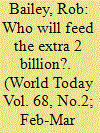

|
|
|